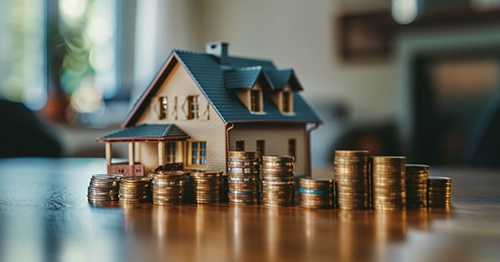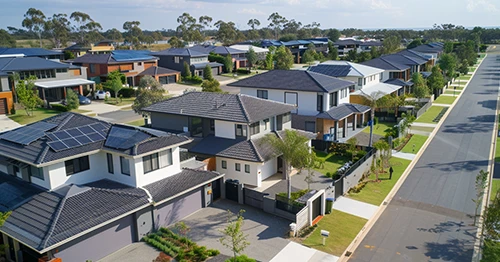Updated: 29 May, 2025
The Australian housing market has been in a downturn since last year, with interest rates reaching record highs, shrinking borrowing power and lowering home prices. Many borrowers are looking to refinance to secure a lower interest rate on their home loan. But falling house prices have raised the question of whether this is the right time to refinance because of the negative impact on your equity. There are certain things to consider to make an informed decision.
Property Prices Declining In Australia
CoreLogic data shows the value of Australian houses has dropped by a record 8.4% after peaking in May 2022, due to consecutive rate hikes, high inflation and weak consumer sentiment. Among the major cities, Sydney recorded the largest fall, 12.1%, over the 2022 calendar year. Additionally, 80.7% of the nation’s house and unit markets recorded a decline in the December quarter of 2022, which was more than eight times the 10% proportion that recorded a fall during the same quarter of the previous year.
Should I Refinance In A Falling Market?
Every customer’s situation is unique. Refinancing can have various motivations, including obtaining better rates, accessing equity, consolidating debt, removing a guarantor and others. There is no one best time to refinance and the decision to do it should be based on what you want to achieve. For example, refinancing may be a good choice if you want lower interest rates, but it’s not the ideal option if you’re seeking to access the equity in your home. Considering this, is it a good time to refinance? Let’s look at some pros and cons.
Pros
Lower Interest Rates
You can probably get a cheaper interest rate. Eight consecutive cash-rate rises have caused interest rates to soar. It has left people with higher repayments and mortgage stress. Refinancing to lower rates can help you lower your monthly repayments and deal with the rising interest rate environment.
Pay Off Your Home Loan Faster
You can reduce the life of your loan by refinancing, if you can afford higher repayments. Refinancing to lenders that allow you to reduce the total term of your loan can help you pay off your home loan faster. This can also save you money on interest. Be aware that you will have to make higher repayments if you choose this option. Also, keep in mind that many lenders will allow you to make extra repayments or pay extra on repayments if you refinance to a lower, variable rate.
You Can Switch To A Fixed Interest Rate
You can refinance and switch your variable rates to a fixed interest rate. This can save you from possible rate rises in the future. A fixed-rate home loan makes your monthly repayments predictable for the locked-in period. Your property value may be dropping but you can at least save yourself from the potential risks.
Cons
Less Equity
Homeowners are concerned because the decline in their house values has caused their equity to fall. When your equity falls, it can affect the rates you are offered and even your chances of loan approval.
For example, you bought a home two years back for $800,000 and took out a home loan of $640,000. In the beginning, you had $160,000 equity in your property. However, after two years, your home’s value has fallen by 10%, to $720,000, and your outstanding loan is $600,000. This means your equity in the property is now only $120,000. Had the value of your home not fallen, you would have $200,000 equity in your property. If your property’s value falls enough, you can even be left with negative equity.
Risk Of Falling Into Negative Equity
Negative equity is a situation where your home’s value drops below the outstanding loan amount. For example, let’s say you bought a home last year for $800,000 with a home loan of $750,000. Now, your outstanding loan balance is $740,000 but your home’s value drops to $720,000. This leaves you with negative equity.
You will not be able to refinance your loan in this situation, as lenders will not approve you until you increase your equity to an acceptable amount. You may not have any option except to stay with the current lender, increase your monthly repayments and wait until the property price increases.
Less Borrowing Power Makes Approval Harder
Lenders assess your borrowing power for refinancing by looking at the value of your property. If your property’s value has dropped, it can decrease the loan amount that the lender will agree to provide you when refinancing.
Additionally, rates have risen now, and that also lowers borrowing power. You may be making all of your repayments and borrowing the same amount but some lenders may say you cannot afford the loan. This is because banks are adding 3 percentage points to the interest rate when assessing your borrowing power. If rates have gone up since you borrowed, then this may mean some lenders will not approve you.
Potential For Additional Costs
Your desired Loan-to-Value Ratio (LVR) affects your financing costs. When your property’s value drops, the percentage of it that you need to borrow to refinance goes up, and that can be costly. You may still be able to refinance your home loan but lenders typically require you to have 20% equity to avoid paying Lenders Mortgage Insurance (LMI), which can cost $10,000 or more. That means having an LVR or 80% or less. If you want to refinance at a LVR of more than 80%, the rate you get won’t be as good and you will probably need to pay a heavy LMI fee.
Some lenders do 85% LVR with waived LMI but there are big differences in rates on offer from lenders if you have less equity. So, it’s important to use a mortgage broker to get the most competitive rates. Call us on 1300 889 743 or fill in our free online assessment form.
Access To Less Equity For Cash-Out Refinance
If you want to do a cash-out refinance to access the equity in your property, you may end up accessing less because of the drop in your property’s value.
For example, suppose you bought a home three years ago for $800,000 with a home loan of $640,000. And you have reduced your loan balance to $600,000. In the past, your home’s value had increased to $1,000,000, but due to nationwide declines, it has fallen to $900,000.
Considering that banks typically lend up to 80% of the property’s value, you can refinance your $600,000 loan into a $720,000 loan and access $120,000 equity.
If you had refinanced when the property value was $1,000,000, you could have unlocked $200,000 in equity by refinancing the same amount.
You cannot do cash-out refinancing if you are in negative equity.
Talk To Home Loan Experts!
Home Loan Experts has specialist mortgage brokers who are experts in refinancing. They can offer you the best options based on your individual circumstances. Delaying the decision can result in higher costs if property prices continue to decline. Call us on 1300 889 743 or fill in our free online assessment form today.





